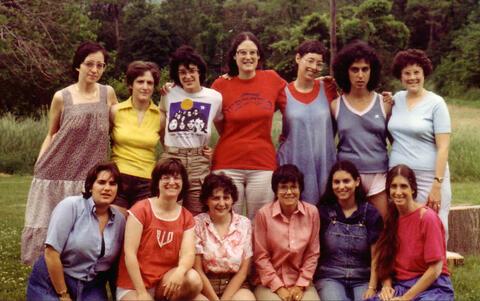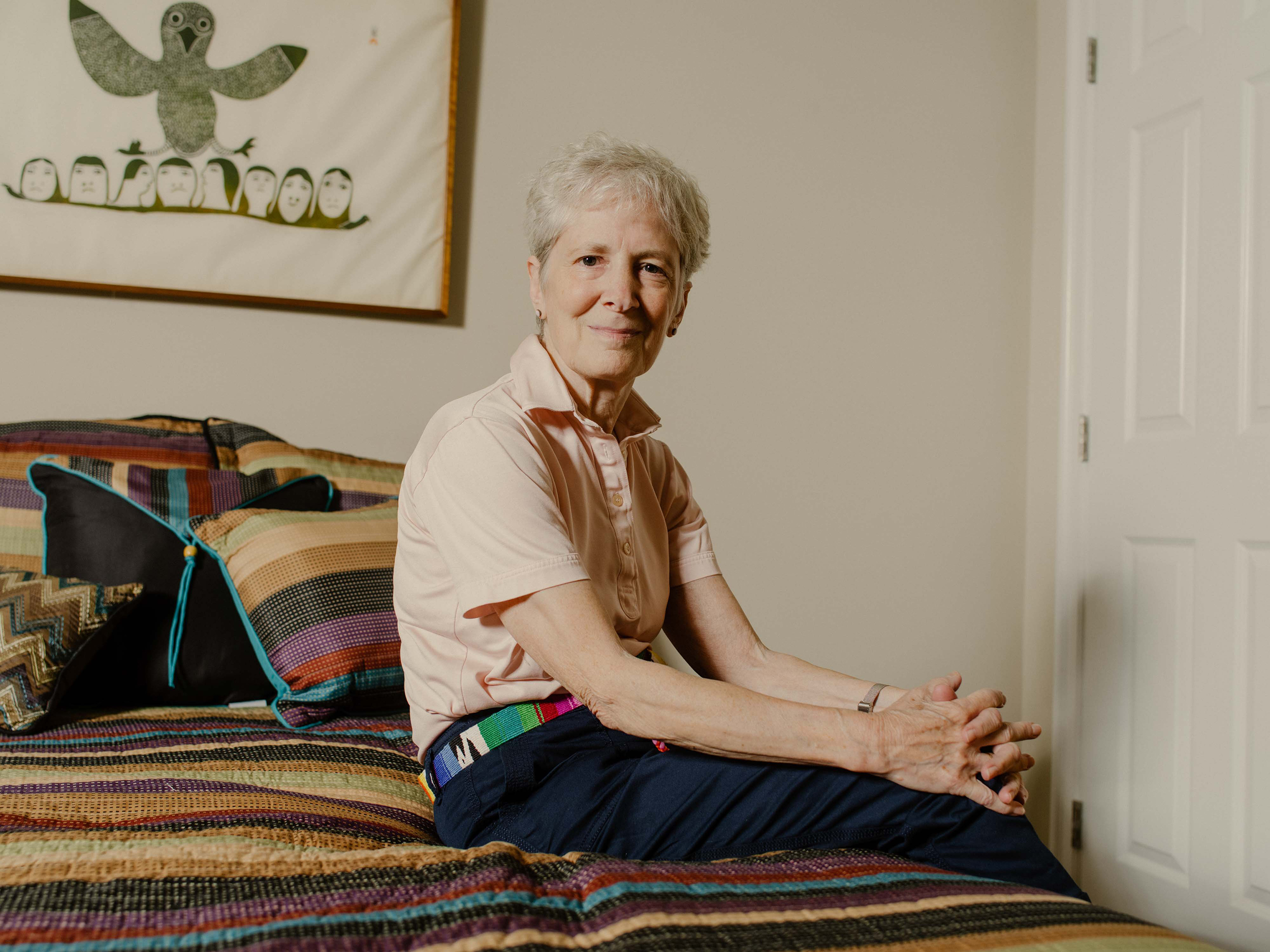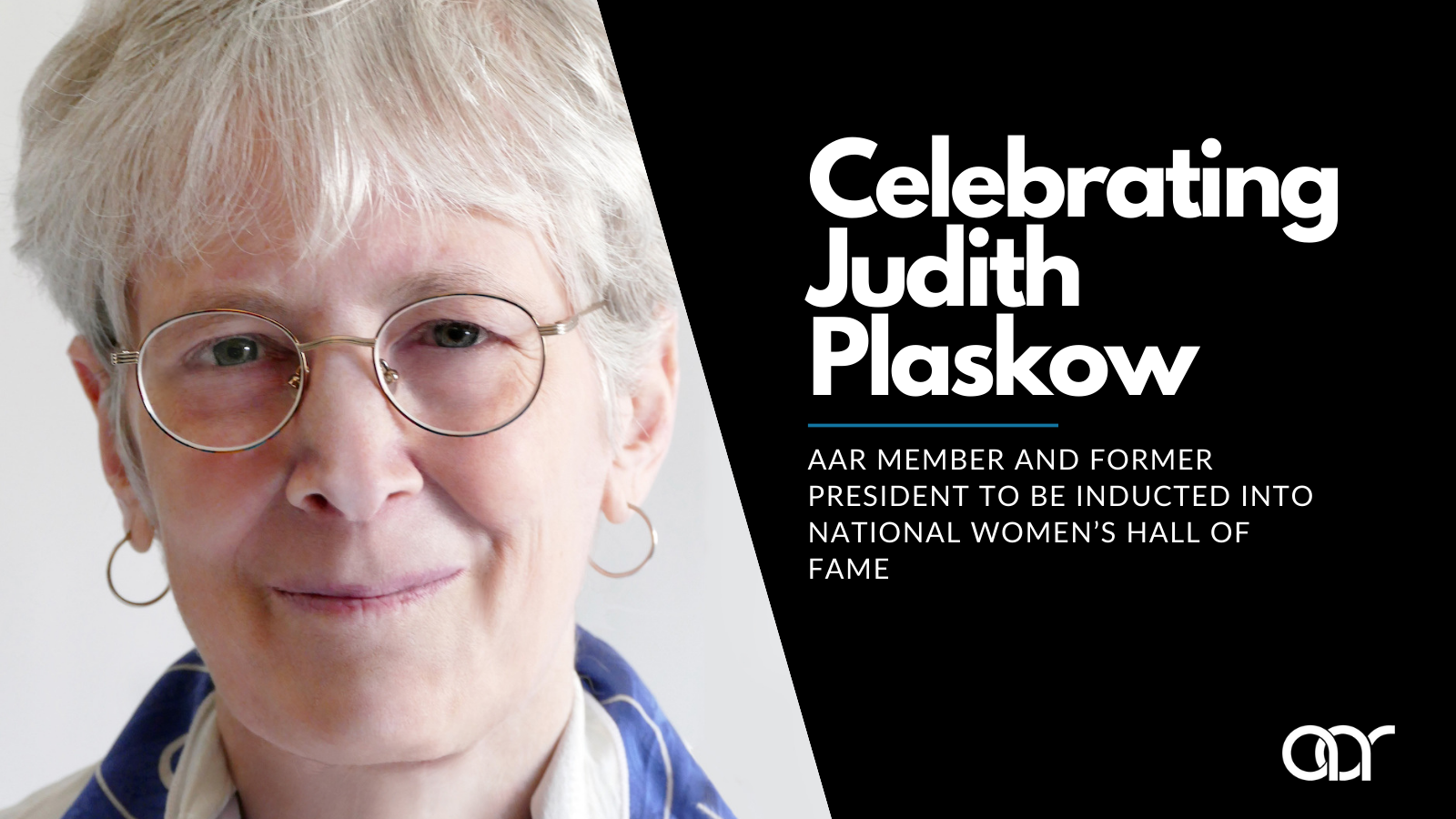AAR Member Judith Plaskow to Be Inducted into the National Womens Hall of Fame
In March 2024, Judith Plaskow will be the first feminist scholar of religion and AAR member to be inducted into the National Women’s Hall of Fame. Her work is a signal contribution to the study of religion, especially her 1990 magnum opus, Standing Again at Sinai: Judaism from a Feminist Perspective, in which she reimagines Judaism’s central tenets and beliefs through her feminist perspective and lifelong commitment to Judaism. She brings her experiences as a woman, scholar, lesbian, and feminist in the religion academy into an analysis that makes her work among the most important books in Judaism in the twentieth century.
As friends who have journeyed with her for decades, we invite everyone in the American Academy of Religion to celebrate this honor for one of our own. Judith is a pioneering innovator and leader who launched many women’s careers through her programming and editorial work. She is a distinguished past president of the AAR; a generous colleague; a dedicated pedagogue, activist, mentor, and scholar; and a role model for colleagues and students alike. Mazel tov!
Judith Plaskow was born in Brooklyn, NY (March 14, 1947), and raised in the Reform movement of Judaism. She received her B.A. in philosophy and literature at Clark University and her masters and doctoral degrees in theology at Yale Divinity School, where she dealt with resistance to her vocation as a feminist theologian.
.jpg)
Judith would be the first to say that her achievements have always been through collaborative work, and Yale was where, in 1969, she formed a deep personal and, for feminist religious scholarship, a consequential friendship with Carol P. Christ. Their long collaboration introduced feminist work in religion far and wide. They opened doors into the academy for countless colleagues through their co-edited, early and influential feminist anthologies. Judith stands out also as a pioneer who began working in theology to create her own Jewish feminist theology. In her definitive 1982 essay, “The Right Question is Theological,” she laid out a compelling critique of the lack of women’s voices and patriarchal focus of Judaism, especially with regard to God, Torah, and Israel, which needed to be changed. (Photo: Courtesy of Judith Plaskow)
Throughout her career, Judith has generated new vehicles for study, community, and activism. Early formative experiences that fueled her work include the landmark “Women Exploring Theology” conference in 1972 at Grailville in Loveland, Ohio, where Judith wrote her famous feminist midrash, “The Coming of Lilith.” Lilith was the name given by the ancient rabbis to Adam’s first wife, who was depicted as a demon in Jewish folklore. In Judith’s bonding of Lilith to Eve in sisterhood instead of rivalry and making Lilith the story’s heroine, feminist Judaism was born. At the same event, she met Elisabeth Schüssler Fiorenza with whom she would co-found and co-edit the Journal of Feminist Studies in Religion in 1985.
Judith also spent a significant time at Harvard Divinity School as an early participant in what was then the Research Resource Associates Program (1973), now a robust research component of Women’s Studies in Religion. In the same year, Judith gave a keynote address, “The Jewish Feminist: Conflict of Identities” at the first National Jewish Feminist Conference in New York, attended by hundreds of Jewish women who were looking for ways to be both feminist and Jewish. The positive response to this presentation encouraged her to develop her thinking about how to connect feminism and Judaism from the hard-earned perspective and resources of a well-trained theologian.
 In 1981, Judith joined colleagues to found the Jewish feminist spirituality group B’not Esh (“daughters of fire,”), which inspired her magnum opus Standing Again at Sinai. She also played a central role with B’not Esh in creating new liturgy, midrash, ritual, and interpretations of Jewish history and culture that have made a way into synagogues, Hebrew schools, and Jewish Studies courses, literally changing the lives and religious practices of the liberal Jewish community.
In 1981, Judith joined colleagues to found the Jewish feminist spirituality group B’not Esh (“daughters of fire,”), which inspired her magnum opus Standing Again at Sinai. She also played a central role with B’not Esh in creating new liturgy, midrash, ritual, and interpretations of Jewish history and culture that have made a way into synagogues, Hebrew schools, and Jewish Studies courses, literally changing the lives and religious practices of the liberal Jewish community.
(Photo: From the first B'not Esh retreat, held in May 1981. Source)
Judith taught at several universities (including New York University and Wichita State University) before finding her academic niche at Manhattan College. In that Catholic institution, she was freer than many Catholic colleagues to raise hard issues and stake out positions that pushed Catholic envelopes, as well as Jewish ones. She was also part of the illustrious group of feminist scholars who founded the Women’s Caucus and the Women and Religion Unit of the AAR.
She received a prestigious Bunting Fellowship at Radcliffe College in 1986, a fellowship program founded in 1959 to provide support for promising professional women making important contributions to their fields. With the publication of Standing Again at Sinai, Judith became recognized throughout the Jewish world as a bold and innovative thinker. That book remains required reading in undergraduate courses on religious feminism and in Jewish Studies classes in universities and synagogues. Her work is now part of the canonical writings of Jewish theology, having stood the test of time.
In 2001, Judith was among a select few distinguished former Bunting fellows such as Nancy Chodorow, Judith Herman, Gish Jen, and Sue Miller, who were invited to return as senior fellows to celebrate the first year of the Radcliffe Institute for Advanced Study, which was created as the tenth school at Harvard University when the University merged with Radcliffe College in 1999.
In her editorial introduction to the anthology of Judith’s essays, The Coming of Lilith: Essays on Feminism, Judaism, and Sexual Ethics (2005), editor Donna Berman claimed that Judith’s work asks readers to “honestly confront and acknowledge that which is difficult and painful to see in ourselves, our tradition, and in God.” Judith has revealed the difficult and painful dimensions but her challenges also aim to improve on aspects of Jewish religion and culture by creating a Jewish feminist theology that revolutionized Jewish religious life.
As the leading Jewish feminist theologian, Judith has been invited to teach courses at the Reform rabbinical school, Hebrew Union College, in New York City. She has guest lectured in synagogues and prestigious institutes throughout the Jewish world. In addition to her ongoing work to reshape Judaism, Judith continued throughout her career to be active in academy leadership. She was an original member of the AAR Status of Women in the Profession Committee and was a co-writer and co-editor of that group’s first guide for women and religion, Guide to the Perplexing: A Survival Manual for Women in Religious Studies (1992). She was elected President of the AAR in 1998, and subsequently, as a member of the nominating committee, worked to help Vasu Narayanan to become the first woman of color President of the AAR.
Judith’s more recent co-authored work with Carol Christ, Goddess and God in the World: Conversations in Embodied Theologies (2016), is a dual theological memoir. Judith notes why she has chosen to remain an active participant in the Jewish community, in contrast to Carol, who long ago left the Christian world. Their respective histories shape their views of the divine—Christ’s more gynomorphic approach to Plaskow’s more abstract sense of creative power. They conclude with a conversation about how their narrative theologies fit into the context of larger feminist issues and approaches.
In her decades of conversations across lines of difference and division, Judith has demonstrated courage, integrity, generosity, and sensitivity. She describes in her 2016 book how painful it was to be challenged early in her career by a Muslim feminist who found her use of tzedakah problematic. In 1978, she wrote what may have been her most courageous and influential piece, “Christian Feminism and Anti-Judaism,” which challenged Christian feminists to recognize how works on Jesus as a feminist and some Goddess worship materials misrepresent ancient Judaism.

When Judith came out publicly as a lesbian, she wrote frequently and passionately to challenge Jewish laws and values that discouraged and limited LGBTIQ+ people’s participation in Jewish religious life and in the larger society. She has used her privilege and fame to write, speak out, and demonstrate as a Jewish activist in support of transgender folk, Jews of color, Palestinians, and those in the disability rights movement. She has also encouraged Jews to join her in her involvement in economic justice work and, most recently, in Black Lives Matter. (Photo credit: Heather Stern for NBC News)
One memorable creative example of her activism happened in 2015, when Judith and her partner Martha Acklesberg attended a pricey luncheon at the Plaza Hotel in New York City, where candidate Trump was the featured speaker. Protestors outside and inside were prevented, in some cases violently, from making their views known. Judith and Martha arrived dressed for the occasion and made their way inside. According to Carol P. Christ’s correspondence with her, Judith wrote:
The idea was that after those who pushed their way in had been ejected, and the buzz had died down, we who had blended into the crowd would get up in twos and threes and protest further. When our turn came, Martha and I sang, “We are a kind and welcoming people, and we are singing, singing, against hate.” [We Note: Having beautiful, trained voices did not prevent them from being escorted out.] When we traveled to see the places where the civil rights movement began last month, we recited the blessing for studying Torah before we visited major sites. Our group recited the same blessing before we went into the Plaza Hotel.
Judith wrote elsewhere that after they were ejected, they stopped payment on their checks, demonstrating that feminists, indeed, have a sense of humor and justice.
These highlights from a long and distinguished career that continues at this writing are just a few of the many reasons why Judith Plaskow is the first feminist religion scholar to be honored in the National Women’s Hall of Fame. But none is more important than the coherence of her life: her work for justice; her ground-breaking, influential writing and editing; her generous commitment to advance the careers of diverse feminist religion scholars and to build community among us; her many years of leadership in the academy; and her lifelong political involvements for change. Generations to come will see her in the Hall and realize the strong shoulders on which they stand.





